Back to Sydney

|
We Return to
Sydney
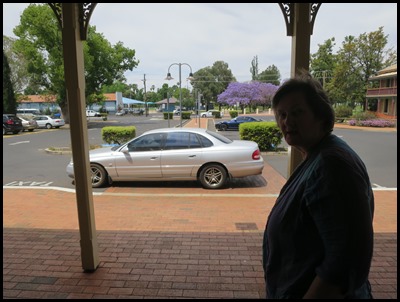 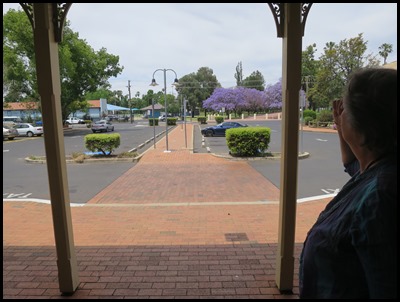 Up and packed it was time to leave
Merrygoen. Our final trip in the beast to the train station in Dubbo. The
‘colonel’ informed us that the total of our road trips came to three thousand,
eight hundred and eighty eight kilometers. We bade our brief ‘goodbyes’, watched
and waved as the beast pulled away and disappeared.
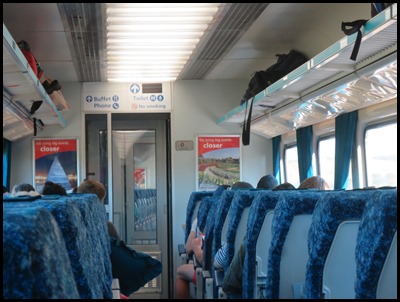 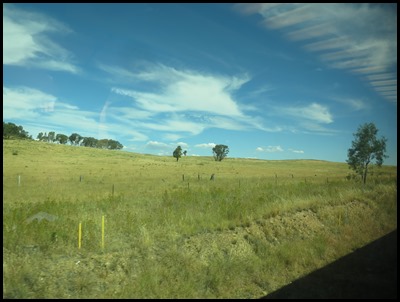 We had a couple of hours before the
train came in so we ate lunch in the happy cafe. Train in on time but as this
was its last stop we had to wait until the hoovering had been done and all the
seats had been reversed to face the right way round. Once settled Bear took this
picture of our carriage that told us the buffet car
was in front of us, no, that’ll be the other way then. Soon we were leaving the
very dry heat and crispy fields for softer
greens.
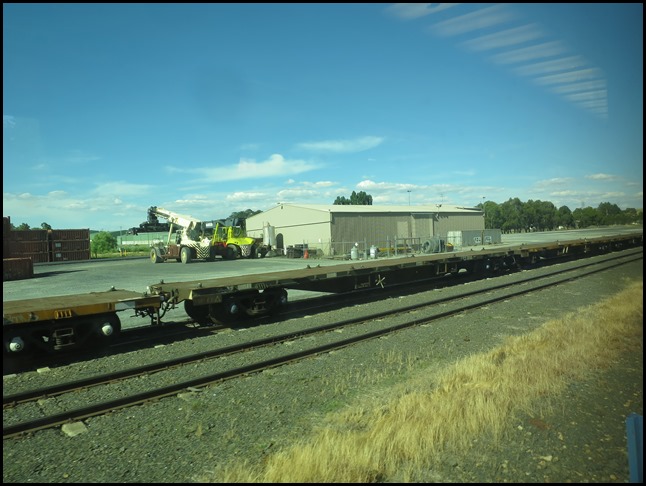 We took ages to go past this flat bed train waiting for its load of
containers.
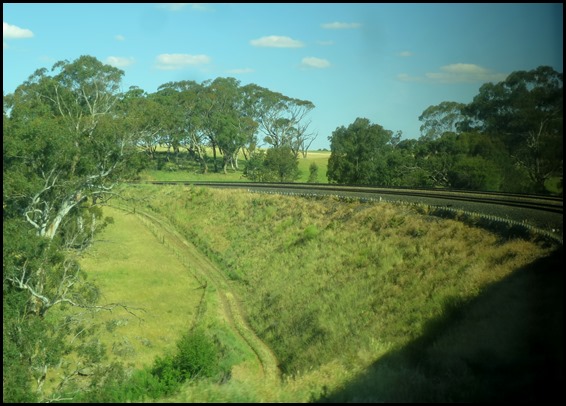 A massive curve in
the track, slowly taken.
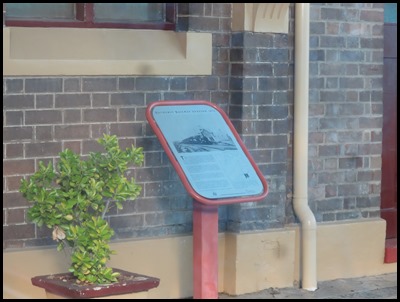 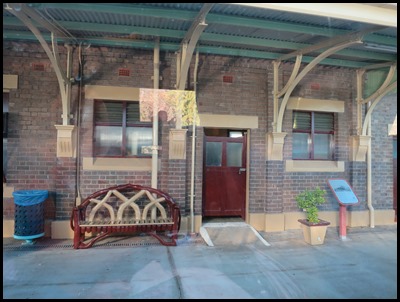 We passed through the famous Bathurst Station. The Great
Western Railway (now the Main
Western Line) was opened as far as Bathurst on the 4th of April 1876 by the
then Governor of
New South Wales, Sir Hercules
Robinson. Tenders for the
Railway Station buildings were called in 1875, and the Victorian Tudor style
building in Keppel Street opened on the day the railway line arrived. Along with the station building a goods
shed, Divisional Engineers office, and a grand two story Station Masters
residence were also completed in 1876. Gas lighting was installed to the
station and the adjoining Station Master's residence in 1882. Other early buildings and structures
included a Stores office (c1876), coal
stage (relocated from Raglan in 1877), new
coal stage (1878), blacksmith’s shop (1878-1879), turntable (relocated from Rydal in 1879),
enginemens depot (1879), engine shed (1881) and the West signal box
(1885)
During the 1880’s the Railway Commission in New South Wales built workshops on the land adjoining the station. This started a large railway workers' community and a Rail Institute, which made many jobs available and drew thousands of workers to Bathurst. In the early years of the 20th century, Ben Chifley, later Prime Minister of Australia, attended night school and extension classes there. Union meetings Chifley attended at the Institute helped to shape his Labour convictions. Many changes and additions were made to the Bathurst rail yards in the late 19th century and 20th century, examples of which include the original stockyards (c1900), a wagon repair shed (1891), a new turntable (1897), platform lengthened (1897), waiting shed erected on the Down platform (1902), Down platform extended and widened (1911), line duplicated (1915) elevated coal storage (1916), refreshment room (1917), new T6 trucking yards (1927), and an additional signal box (East Box) in 1944. Following WWII (between 1945 and 1960) there were as many as 500 railway workers working at Bathurst station and yard. By the 1970’s, changes in freight transportation trends and the move from steam to diesel locomotives resulted in the redundancy of many buildings and former functions on site and the rationalisation of many structures. The refreshment room closed in 1968 and The Railway Institute in 1975. 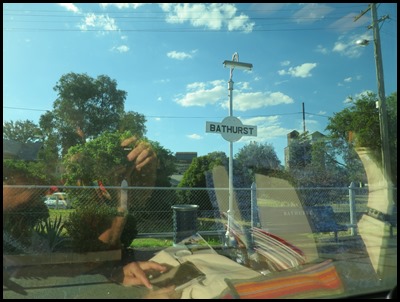 We took this picture and come to choose photographs for this blog, why have we this – I can’t remember, better look it up. Yes, Captain. Bathurst is a regional city in the Central Tablelands of New South Wales. Approximately one hundred and twenty miles west of Sydney, is the oldest inland settlement in Australia and had an estimated population of 33,110 people on 2011 Census night. Bathurst is often referred to as the Gold Country as it was the site of the first gold discovery and where the first gold rush occurred in Australia.
Really lush
scenery.
 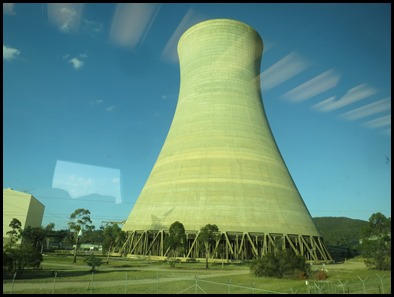 A power
station.
 On through the
Blue Mountains where we saw the Three Sisters.
 One of the double-deckers Bear so admires.
 Oh hello.... so much so he took
another double-decker........Mmmm.
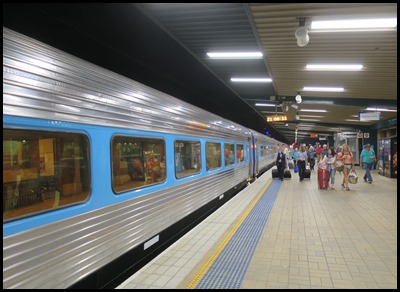 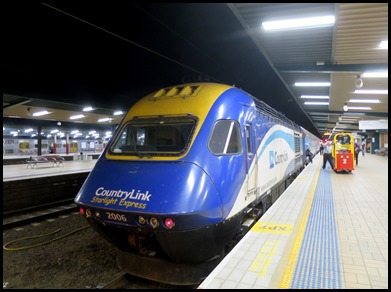 We pulled
in at nine o’clock and said ‘farewell’ to the rather smart, blue chap.
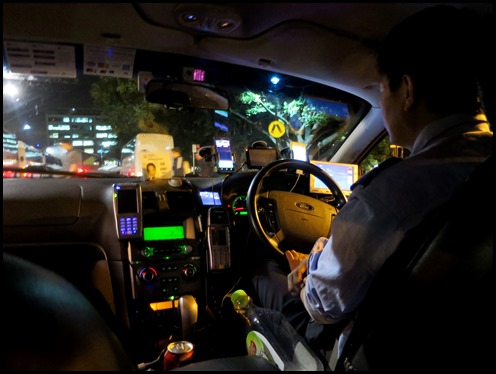 Our lovely Mandarin speaking taxi
driver had the most phones, gadgets and equipment we
have ever seen, ever.
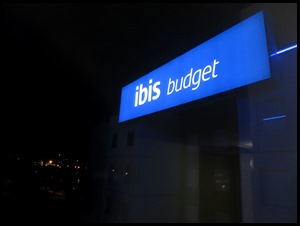 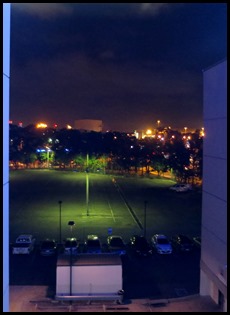 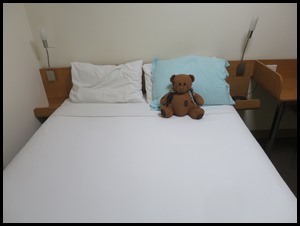 Soon out of the lift at the Ibis Budget, over the bridge to look this way over
the car park, the other directly over the Domestic
Airport plane parking area. Beds happily settled in
our tiny room. Bear just had space to get between the en suite door and the bed.
The en suite was very compact. The shower washed the sink and toilet at the same
time, but hey, here we are, nestled for two nights.
ALL IN ALL GOOD TO SEE THE
CHANGING COUNTRYSIDE
AMAZING CHANGES FROM ARID TO GREENERY TO
CITY |
